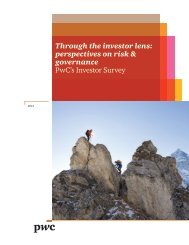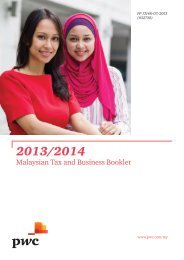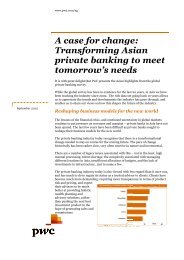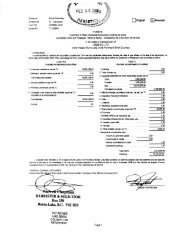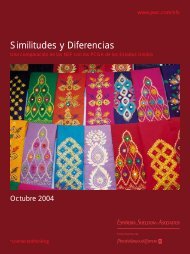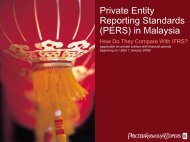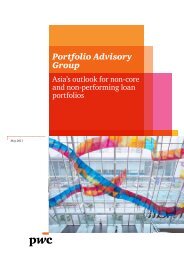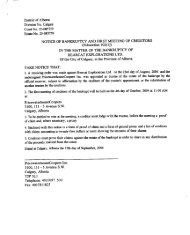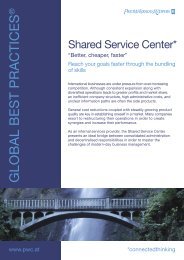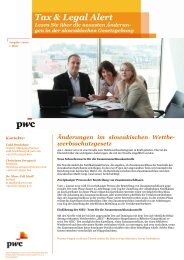TLS Newsletter 11 marzo 2011 - PwC
TLS Newsletter 11 marzo 2011 - PwC
TLS Newsletter 11 marzo 2011 - PwC
You also want an ePaper? Increase the reach of your titles
YUMPU automatically turns print PDFs into web optimized ePapers that Google loves.
La Cassazione si esprime nuovamente<br />
in merito all’abuso del<br />
diritto in materia tributaria<br />
(Claudio Valz - Mia Pasini)<br />
Con sentenza n. 1372, del 21 gennaio 20<strong>11</strong>, la Corte di<br />
Cassazione ha approfondito il tema dell'applicazione<br />
del principio dell'abuso del diritto in campo tributario in<br />
caso di operazioni di riorganizzazione societaria.<br />
I giudici della Suprema Corte hanno, innanzi tutto, sottolineato<br />
che, al fine di applicare il principio dell’abuso<br />
del diritto, è onere dell’Amministrazione Finanziaria provare<br />
le anomalie delle operazioni intraprese dal contribuente<br />
il quale, invece, deve dimostrare che le finalità<br />
perseguite non fossero esclusivamente rivolte all’ottenimento<br />
del mero vantaggio fiscale.<br />
Nell’ambito della sentenza è stata, inoltre, ribadita la<br />
necessità di usare una cautela “massima” nell’applicazione<br />
di tale principio in caso di ristrutturazioni societarie<br />
di grandi gruppi d'imprese in quanto rispecchiano<br />
generalmente particolari logiche di mercato e peculiarità<br />
strategiche di gruppo che possono non coincidere con la<br />
mera e immediata redditività economica.<br />
*<br />
Il caso sottoposto all’attenzione della Suprema Corte si<br />
riferiva ad una ripresa a tassazione del costo per interessi<br />
su prestiti ricevuti per finanziare una ristrutturazione<br />
infragruppo.<br />
L’Ufficio ha sostenuto la natura elusiva dell’operazione,<br />
affermando che lo stesso risultato poteva essere ottenuto<br />
mediante la fusione tra due società del gruppo senza<br />
necessità di indebitamento. L’operazione “suggerita”<br />
dall’Ufficio sarebbe, pertanto, stata soggetta ad una<br />
maggiore tassazione.<br />
Prima di esprimersi nel merito della questione, la<br />
Suprema Corte ha ribadito che: “Si considerano aventi<br />
carattere abusivo, e che possono, quindi, essere disconosciute<br />
dell'amministrazione finanziaria, quelle pratiche<br />
che, pur formalmente rispettose del diritto interno o<br />
comunitario, siano poste in essere al principale scopo<br />
di ottenere benefici fiscali contrastanti con la ratio delle<br />
norme che introducono il tributo o prevedano esenzioni<br />
o agevolazioni”.<br />
Dopo aver evidenziato il rango comunitario e/o costituzionale<br />
del principio di abuso di diritto e la sua indubbia<br />
applicabilità d’ufficio anche nel giudizio di legittimità, la<br />
Corte di Cassazione ha sottolineato che, al fine di ritenere<br />
un’operazione abusiva, lo scopo di risparmio fiscale ad<br />
essa sottostante non deve essere esclusivo bensì determinante.<br />
Another Supreme Tax Court decision<br />
on the abuse of law principle<br />
relevant to the tax matter<br />
(Claudio Valz - Mia Pasini)<br />
With the decision n. 1372, of 21th January 20<strong>11</strong>, the Italian<br />
Supreme Tax Court analyzed the matter of the application<br />
of the principle of “abuse of law” in the tax field in case<br />
of transactions relevant to business restructuring.<br />
In the mentioned decision, the judges of the Supreme Tax<br />
Court underlined that, in order to apply the principle of<br />
“abuse of law”, the Tax Administration has the burden to<br />
prove the avoidance nature of the transactions performed<br />
by the tax-payer who, instead, has to prove that the final<br />
purposes of the transactions are not exclusively to obtain a<br />
mere tax advantage.<br />
Moreover, within the decision, it has been confirmed the<br />
necessity to adopt the “highest” caution in the application<br />
of this principle in case of business restructuring of large<br />
groups of companies because they generally reflect particular<br />
market logics and peculiar strategies of the group that<br />
could not coincide with a mere and immediate business<br />
profitability.<br />
The case evaluated by the Supreme Tax Court concerned a<br />
case in which the Tax Authorities contested the deductibility<br />
of the passive interests deriving from loans relevant to the<br />
funding of an intercompany restructuring transaction.<br />
The Tax Agency sustained the tax avoidance nature of the<br />
transaction, having affirmed that the same result could<br />
have been obtained through a merger between two companies<br />
of the group, without the necessity to ask for a loan<br />
and incur in passive interest. Therefore, the transaction<br />
“suggested” by the Tax Agency would have had a greater tax<br />
burden.<br />
First of all, the Supreme Tax Court reaffirmed that: “those<br />
transactions that, even if formally compliant with the<br />
National and the European law, are carried out mainly in<br />
order to obtain tax benefits that are contrasting with the<br />
ratio of the laws that introduce the tax or that provide for<br />
exemptions or facilities have to be considered having a tax<br />
abusive nature and so they could be challenged by the Tax<br />
Authorities”.<br />
Having considered that the abuse of law is an European<br />
and/or Constitutional principle and, therefore, it is required<br />
to be applied ex-officio also in the judgments in front of<br />
the Supreme Tax Court, the Supreme Tax Court underlined<br />
that, in order to consider a transaction as “abusive”, the<br />
purpose of the tax saving has not to be exclusive but rather<br />
decisive.<br />
41 <strong>TLS</strong> <strong>Newsletter</strong> n° 3 Anno 20<strong>11</strong><br />
*



